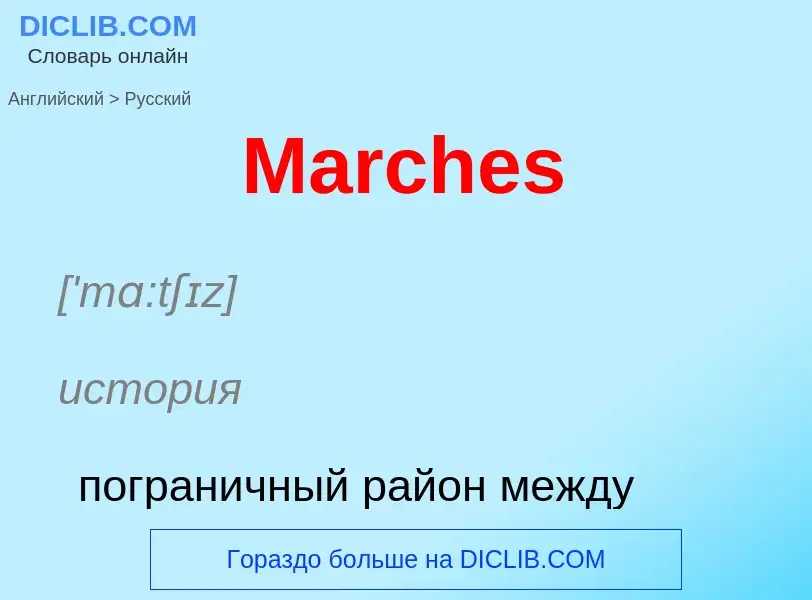Translation and analysis of words by ChatGPT artificial intelligence
On this page you can get a detailed analysis of a word or phrase, produced by the best artificial intelligence technology to date:
- how the word is used
- frequency of use
- it is used more often in oral or written speech
- word translation options
- usage examples (several phrases with translation)
- etymology
Marches - translation to russian
['mɑ:tʃɪz]
история
пограничный район между Англией и Шотландией или Англией и Уэльсом
['ɔ:ldə,mɑ:stən,mɑ:tʃ]
общая лексика
Олдермастонский поход (сторонников мира; марш протеста против ядерного оружия, впервые проведённый членами организации "Движение за ядерное разоружение" [Campaign for Nuclear Disarmament] 4 апреля 1958 по маршруту Лондон - Олдермастон)
синоним
Definition
Wikipedia
In medieval Europe, a march or mark was, in broad terms, any kind of borderland, as opposed to a national "heartland". More specifically, a march was a border between realms or a neutral buffer zone under joint control of two states in which different laws might apply. In both of these senses, marches served a political purpose, such as providing warning of military incursions or regulating cross-border trade.
Marches gave rise to titles such as marquess (masculine) or marchioness (feminine) in England, marqués (masculine) and marquesa (feminine) in Spanish-speaker countries, as well as in the Catalan and Galician regions, marquês (masculine) and marquesa (feminine) in Portuguese-speaker countries, markesa (both masculine and feminine) in Basque, marquis (masculine) or marquise (feminine) in France and Scotland, margrave (German: Markgraf, lit. 'march count'; masculine) or margravine (German: Markgräfin, lit. 'march countess', feminine) in Germany, and corresponding titles in other European states.

![Cumania]], [[Székely Land]] and [[Transylvanian Saxons]]) in the late 13th century Cumania]], [[Székely Land]] and [[Transylvanian Saxons]]) in the late 13th century](https://commons.wikimedia.org/wiki/Special:FilePath/Hungary 13th cent.png?width=200)
![limes]] or border between the [[Saxons]] and the Slavic [[Obotrites]], established about 810 limes]] or border between the [[Saxons]] and the Slavic [[Obotrites]], established about 810](https://commons.wikimedia.org/wiki/Special:FilePath/Limes.saxoniae.wmt.png?width=200)
![Map of the [[Military Frontier]] against incursions from the [[Ottoman Empire]] in the middle of the 19th century (marked with a red outline) Map of the [[Military Frontier]] against incursions from the [[Ottoman Empire]] in the middle of the 19th century (marked with a red outline)](https://commons.wikimedia.org/wiki/Special:FilePath/Militargrenze, Wojwodowena und Banat.jpg?width=200)
![Map of the [[Wild Fields]] in the 17th century Map of the [[Wild Fields]] in the 17th century](https://commons.wikimedia.org/wiki/Special:FilePath/Ukraine-Dyke Pole.png?width=200)


![[[Indesit]] Headquarters in [[Fabriano]], [[Province of Ancona]]. The home appliance sector represents the core of the regional industry [[Indesit]] Headquarters in [[Fabriano]], [[Province of Ancona]]. The home appliance sector represents the core of the regional industry](https://commons.wikimedia.org/wiki/Special:FilePath/Indesit Headquarter.jpg?width=200)
![A view of [[Monte Conero]] A view of [[Monte Conero]]](https://commons.wikimedia.org/wiki/Special:FilePath/Sirolo-vista conero.jpg?width=200)
![The Renaissance town of [[Urbino]] The Renaissance town of [[Urbino]]](https://commons.wikimedia.org/wiki/Special:FilePath/Urbino-palazzo e borgo.jpg?width=200)
